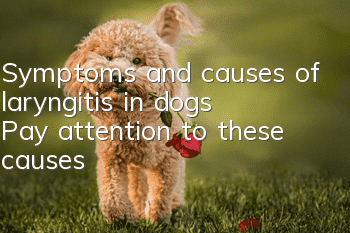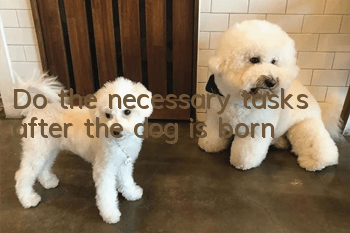Symptoms and causes of laryngitis in dogs: Pay attention to these causes

Symptoms of laryngitis in dogs
1. Coughing is the main symptom of this disease. In the early stage, because there is not much exudate, it is mostly a dry and painful short cough. As the exudate increases, the cough becomes long and moist, and the pain is relieved. Coughing worsens when exposed to cold and often occurs as spasmodic coughing, with abnormal vomiting occurring after coughing.2. The larynx is swollen, the head and neck are stretched, and the inspiratory breathing is difficult. In severe cases, it may even cause suffocation.
3. Palpation of the larynx shows that due to swelling and increased sensitivity of the laryngeal mucosa, the sick dog is in pain, ducking, shaking its head and stretching its neck.
4. During laryngeal auscultation, dry rales can be heard when the exudate is small and thick. When the exudate is thin, loud bubbling sounds can be heard. When the larynx is severely swollen and highly narrowed, a laryngeal stenosis sound can be heard.
5. Sick dogs sometimes discharge serous, mucus or mucopurulent nasal fluid.
6. In mild laryngitis, systemic symptoms generally do not change significantly.
7. Severe laryngitis, elevated body temperature, increased pulse rate, and difficulty breathing.
8. Chronic laryngitis, long-term fever, dull cough, and hoarse cough. The larynx is slightly sensitive to palpation. Rhinitis and laryngoscopy revealed that the mucosa was hypertrophic, swollen, and granular or nodular.
Common causes of laryngitis in dogs
The causes of laryngitis in dogs are similar to rhinitis. 1. Primary laryngitis is mainly caused by cold, chemical, thermal and mechanical stimulation.
2. Secondary laryngitis is often caused by the spread of inflammation in adjacent organs. Laryngitis is often complicated by the onset of certain viral or bacterial infectious diseases (such as canine distemper, influenza, mycoplasmosis, canine adenovirus disease, etc.).
Treatment of laryngitis in dogs
The principle of treatment of laryngitis in dogs is to strengthen care, eliminate inflammation, eliminate phlegm and relieve cough.1. Strengthen care: First remove the primary cause of the disease, place the sick dog in a warm and well-ventilated kennel, provide soft and easily digestible food, and drink plenty of water to reduce irritation to the throat mucosa.
2. Eliminate inflammation: In order to promote the dissipation of inflammation, accelerate the absorption of exudates and relieve pain, you can use 10% hypertonic saline and magnesium sulfate solution to warm the throat twice a day. Apply 10% camphor alcohol, fish ointment and other stimulants locally. When the nasal fluid is thick, use compound benzoin tincture, 1-2% sodium bicarbonate solution, 2% alum solution, 1-20lo tannic acid solution vapor to inhale. If the inflammation is severe, antibiotics and sulfonamide preparations can be used. Penicillin can also be dripped into the throat cavity.
3. Expelling phlegm and relieving cough: When cough occurs frequently, 0.05g of morphine hydrochloride, 20ml each of almond water and fennel water can be taken orally, one spoonful at a time. Or codeine phosphate solution, 0.50/0 atropine sulfate solution 0.2-0.5 ml subcutaneous injection. Because atropine antagonizes acetylcholine, it has a parasympathetic effect, and has an antitussive effect through its antispasmodic effect on bronchial smooth muscle.
4. In case of chronic laryngitis, astringent can be dripped into the throat cavity, such as 0.1~0.3% silver nitrate, compound iodine solution and 1% alum solution, etc.
5. If there is a risk of suffocation, the dog’s tracheotomy should be performed immediately.
Random articles
- Diagnosis and treatment of dog fever
- What should I do if my pet dog is allergic to vaccines?
- How to brush your dog’s teeth? What should I do if my dog refuses to brush his teeth?
- What should I do if my dog keeps scratching and biting?
- What are the most common oral and dental diseases in dogs? Dog Oral Care!
- What are the training tips for Australian Cattle Dogs?
- Research shows that dogs raised in cities are more likely to develop social anxiety than dogs raised in rural areas
- How to train a Great Pyrenees
- Why do dogs sigh?
- What are the symptoms of dystocia in dogs, and what should I do if my dog has dystocia?



